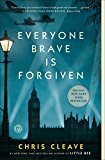Summary | Excerpt | Reading Guide | Reviews | Beyond the Book | Readalikes | Genres & Themes | Author Bio

"Come on out, Zachary Lee, I know you're in here."
It was eerie to be in the gorilla house, looking out through the smeared glass. "Oh do come on, Zachary darling. You'll get us both in trouble."
A second cough, and a rustle under the straw. Then, with his soft American accent, "I'm not coming out."
"Fine then," said Mary. "The two of us shall rot here until the war is over, and nobody will ever know what talent we might have shown in its prosecution."
She sat down beside the boy, first laying her red jacket on the straw to sit on, with the rosy silk lining downward. It was hard to stay glum. One could say what one liked about the war but it had got her out of Mont-Choisi ahead of an afternoon of double French, and might yet have more mercies in store. She lit another cigarette and blew the smoke into a shaft of sunlight.
"May I have one?" said the small voice.
"Beautifully asked," said Mary. "And no. Not until you are eleven."
From the muster point came the sound of a tin whistle. It could mean that heavy bombers were converging on London, or it could mean that the children had been organized into two roughly matched teams to begin a game of rounders.
Zachary poked his head up through the straw. It still amazed Mary to see his brown skin, his chestnut eyes. The first time he had smiled, the flash of his pink tongue had delighted her. She had imagined it would be—well, not brown also, but certainly as antithetical to pink as brown skin was to white. A bluish tongue, perhaps, like a skink's. It would not have surprised her to learn that his blood came out black and his feces a pale ivory. He was the first Negro she had seen up close—if one didn't count the posters advertising minstrelsy and coon shows—and she still struggled not to gawk.
The straw clung to his hair. "Miss?" he said. "Why did they take the animals away?"
"Different reasons in each case," said Mary, counting them off on her fingers. "The hippopotami because they are such frightful cowards, the wolves since one can never be entirely sure whose side they are on, and the lions because they are to be parachuted directly into Berlin Zoo to take on Herr Hitler's big cats."
"So the animals are at war too?"
"Well of course they are. Wouldn't it be absurd if it were just us?"
The boy's expression suggested that he had not previously taken the matter under consideration.
"What are two sevens?" asked Mary, taking advantage.
The boy began his reckoning, in the deliberate and dutiful manner of a child who intended to persevere at least until he ran out of fingers. Not for the first time that week, Mary suppressed both a smile and a delightful suspicion that teaching might not be the worst way to spend the idle hours between breakfast and society.
On Tuesday morning, after taking the register and before distributing milk in little glass bottles, Mary had written the names of her thirty-one children on brown luggage labels and looped them through the top buttonholes of their overcoats. Of course the children had exchanged labels with one another the second her back was turned. They were only human, even if they hadn't yet made the effort to become tall.
And of course she had insisted on calling them by their exchanged names—even for boys named Elaine and girls named Peter—while maintaining an entirely straight face. It delighted her that they laughed so easily. It turned out that the only difference between children and adults was that children were prepared to put twice the energy into the project of not being sad.
"Is it twelve?" said Zachary.
"Is what twelve?"
"Two sevens," he reminded her, in the exasperated tone reserved for adults who asked questions with no thought to the expenditure of emotion that went into answering.
Mary nodded her apology. "Twelve is jolly close."
Excerpted from Everyone Brave is Forgiven by Chris Cleave. Copyright © 2016 by Chris Cleave. Excerpted by permission of Simon & Schuster. All rights reserved. No part of this excerpt may be reproduced or reprinted without permission in writing from the publisher.
Your guide toexceptional books
BookBrowse seeks out and recommends the best in contemporary fiction and nonfiction—books that not only engage and entertain but also deepen our understanding of ourselves and the world around us.